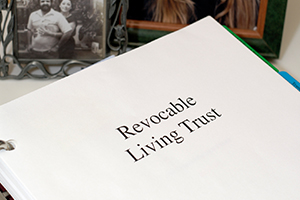|
Monday, July 17, 2017

While the main objective of estate planning is to help individuals protect their assets and provide for loved ones, there are other important considerations, such as planning for incapacity. In short, it is crucial to plan for the type of medical care people wish to receive if a serious accident or illness makes them unable to make or communicate these decisions. By putting in place advance medical directives, such as a durable power of attorney for healthcare and a living will, it is possible to plan for these unexpected events.
Durable Power of Attorney for Healthcare
A durable power of attorney for healthcare is commonly referred to as a healthcare proxy. This estate planning tool enables individuals to designate a trusted family member or friend to make medical care decisions in the event of incapacity. This person essentially acts as an agent, and is responsible for working with doctors and other medical professionals to ensure they provide the type of medical care the incapacitated individual prefers. If a healthcare proxy is not in place, it will be necessary for loved ones to ask the court to appoint someone make these decisions. In the end, this advance medical directive protects individuals in the event of an emergency and relieves others of the burden of going to court.
Living Will
A living will is another important advance medical directive that clarifies the type of medical care an individual prefers to receive if he or she becomes terminally ill and cannot communicate decisions about end of life treatment. In particular, a living will establishes whether certain measures, such as a ventilator or a feeding tube, should be used to prolong the individual's life
Other Essential Healthcare Directives
In situations when an individual becomes critically ill and does not wish to receive extraordinary life prolonging measures, it is necessary to complete a do not resuscitate order (DNR). In the event of a medical emergency, a DNR notifies doctors, nurses and emergency personnel not to use cardiopulmonary resuscitation to keep an individual alive.
Lastly, it is also important to ensure that other healthcare providers and organizations can access an individual's medical records and history. For this reason, it is necessary to complete a HIPAA authorization - a document required by the Health Insurance Portability and Accountability Act.
In the end, the possibility of becoming ill and not being able to communicate is not something most of us want to think about. However, putting in place these important advance medical directives can give you and your loved ones peace of mind knowing that your wishes will be carried out.
Monday, July 10, 2017

Today, blended families have become increasingly common, and many individuals have step-children, that is, children of a spouse or partner. In situations where step-children have not been legally adopted, however, they do not have a legal right to an inheritance from a step-parent. For those who wish to leave step-children part of their estate , it is necessary to include them in an estate plan.
The easiest way to leave gifts to step-children is to name them in a will. As with any other gift, they can be given a percentage of the estate, or specific gifts. If there are other children involved, it is important to avoid confusion by naming each child and step-child by using their individual names, rather than terms such as "descendants," "heirs," or "children."
There are also a number of estate planning tools that can be utilized to include step-children in an inheritance. If the objective is to avoid probate, for example, a revocable living trust can be established in which a step-child is named as a beneficiary. Moreover, it may be necessary to provide for a disabled step-child who is eligible for public benefits by establishing a special needs trust. Lastly, a step-child can also be named as a beneficiary in a life insurance policy or a pay-on-death financial account.
While there is no legal obligation to leave step-children an inheritance, it may be the best choice for those who have a close relationship, or played a significant role, in raising them. However, this will reduce the amount of assets available to other children and beneficiaries. Because blended family relationships are complex and subject to emotional challenges, it is important to explain these decisions with all family members.
By engaging in an open and honest dialogue, you can minimize the potential for strife and the possibility of a will contest. In particular, it is important to clarify why you gave each recipient a gift, the selection of your executor, and your thoughts about the family. Lastly, you are well advised to engage the services of an estate planning attorney who can help ensure your wishes regarding step-children are carried out.
Monday, June 19, 2017
 When it comes to estate planning, many individuals believe that dividing assets equally among adult children is the best choice. However, there are situations in which leaving each child the same amount might not be practical. For this reason, it is important to know the difference between an equal inheritance and an equitable inheritance, in which each child receives a fair share based on his or her circumstances.
What is an equal inheritance?
In this situation, each child gets the same amount of the remaining estate after both parents have died.
This option works well when the needs of each child are the same, or the parents provided similar support to each child in the past. Moreover, each child must be mentally or emotionally capable and financially responsible.
It is important to note that cases in which an estate includes real property and other tangible assets, it may be necessary to determine the differences in value of these assets in order to leave each child an appropriate amount. Lastly, leaving an equal inheritance may be the best way to avoid the emotional and financial costs of disputes.
What is an equitable inheritance?
In some cases, leaving each child and equal inheritance may not be the right thing to do. For example, it may be wise to reward a child who has taken on the role of caregiver for an aging parent or to compensate him or her for lost time and wages. There are also circumstances in which children may have been given different amounts of money while the parents were alive either for a wedding, educational expenses or a down payment on a home.
Lastly, for those who have a disabled child who receives public benefits, it may be necessary to provide for living expenses and medical needs in a special needs trust. In all of these situations, an equitable distribution of the estate assets is the best option.
The Bottom Line
In the end, determinations about the distribution of an estate to surviving children should be made in a way that will preserve family harmony. For this reason, it is important to discuss your decisions with your children and engage the services of an experienced estate planning attorney.
Monday, June 12, 2017

There are many circumstances that can impact an estate plan, not the least of which is divorce. While ending a marriage is complicated, it is not only crucial to arrive at a fair and equitable distribution of the marital assets, but to preserve your estate as well.
While the laws vary from state to state, it is important to understand the difference between separate and marital property. Generally, separate property includes any property owned by either spouse before the marriage, as well as gifts or inheritances received by either party prior to or after the marriage.
Marital property, on the other hand, is any property that is acquired during the marriage such as houses, cars, retirement plans, 401(k)s, IRAs, life insurance, investments and closely held business, regardless of who owns or holds title to the property.
One way to protect an estate in the event of a divorce is to put in place a prenuptial agreement. This legal document specifies each party's property ownership and clarifies their respective property rights should they end the marriage. A prenuptial agreement can reduce the conflict that is normally associated with divorce, avoid court intervention regarding questions of property division and also serve as an effective estate planning tool.
In short, a well designed agreement will distinguish separate property from marital property so that those assets are not misclassified if one of the spouses dies. Moreover, a prenuptial agreement is beneficial to those who are entering into second marriages because it will help to preserve the rights of children from prior relationships. In addition, for those who marry later in life and acquire significant assets, a prenuptial agreement can protect the estate from claims by former spouses.
In the end, a prenuptial agreement can enable each spouse to protect their assets and provide for their loved ones in the event of divorce or death. If you are considering marriage, it is essential to put a comprehensive estate place that includes a prenuptial agreement.
Monday, May 29, 2017

Becoming a new parent is a life changing experience, and caring for a child is an awesome responsibility as well as a joy. This is also the time to think about your child's future by asking an important question: who will care for your child if you become disabled or die? The best way to put your mind at ease is by having an estate plan.
The most basic estate planning tool is a will, which enables a person to determine how his or her assets will be distributed after death. Without this important estate planning tool, the state's intestacy laws will govern how these assets will be distributed. In addition, decisions about who will care for any minor children will be made by the court. For this reason, it is crucial for new parents to have a will as this is the only way to name guardians for minor children.
In this regard, selecting guardians involves a number of important considerations. Obviously, it is important to name individuals who are emotionally and financially capable of raising a child. At the same time, a will can also establish a trust that provides funds to be used to provide for the child's needs. Ultimately, guardians should share the same moral and spiritual values, and childrearing philosophy of the parents.
In addition to naming guardians in a will, it is also critical to plan for the possibility of incapacity by creating powers of attorney and advance medical directives. A durable power of attorney allows a new parent to name a spouse, or other trusted relative or friend, to handle personal and financial affairs. Further, a power of attorney for healthcare, or healthcare proxy, designates a trusted person to make medical decisions in accordance with the parent's preferences.
Finally, new parents should also obtain adequate life insurance to protect the family. The proceeds from an insurance policy can replace lost income, pay household and living expenses, as well as any debts that may have been owed by the deceased parent. It is also important to ensure that beneficiary designations on any retirement accounts are up to date so that these assets can be transferred expediently.
In the end, having a child is a time of joy, but also one that requires careful planning. The best way to protect your family is by consulting with an experienced estate planning attorney who can help you navigate the process.
Monday, May 22, 2017

For many individuals, leaving a legacy of charity is an important component of estate planning, but there are many factors involved in creating a charitable giving plan.
First, it is important to select causes that you believe in such as environmental, educational, religious or medical, or those dedicated to providing food and shelter to the poor. The number of charities you wish to give to depends on your available resources, as well as other beneficiaries of your estate. Many people opt to limit their selections to a handful of charities that are most important to them.
Once charities have been selected, it is crucial to do some homework to make sure the charities are legitimate, and that your gift will be used for the intended purpose, rather than to pay salaries or administrative costs. A good place to start is with the charity's website, and there are many publicly available resources that evaluate charities.
Further, it is important to be realistic about how much of our assets can be dedicated to gift giving, and how those donations should be allocated to the designated charities. Proceeds can either be divided equally, or more money can be provided to the charity you deem most worthy.
Lastly, it is important to avoid the common mistakes many make when planning charitable gifts. It is crucial to ensure that you are donating to a legitimate charity by thoroughly evaluating the agency. In addition, your gift should not be overly restricted since this could make it difficult for the charity to use.If your assets are in stocks, they should not be sold and the profits donated, rather the stocks should be gifted directly to the charity.
In sum, your gift needs to be helpful to the charity, but also take advantage of tax benefits to which you may be entitled, and these objectives can be achieved by establishing a trust. For example, a charitable remainder trust is one into which property is transferred with a charity named as the final beneficiary. In this arrangement, another individual receives income from the trust for a set period of time and then the remainder is given to the charity. In the end, if your objective is to become a sophisticated donor, it is essential to engage the services of an experienced trusts and estates attorney.
Monday, May 15, 2017

Many individuals are aware that a will is one way to plan for the distribution of their assets after death. However, a comprehensive estate plan also considers other objectives such as planning for long-term care and asset protection. For this reason, it is essential to consider utilizing an irrevocable trust.
This estate planning tool becomes effective during a person's lifetime, but it cannot be amended or modified. The person making the trust, the grantor, transfers property into the trust permanently. In so doing, the grantor no longer owns property, and a designated trustee owns and manages the assets for the benefit of the beneficiaries.
In short, irrevocable trust provide a number of advantages. First, the property is not subject to estate taxes because the grantor no longer owns it. Moreover, unlike a will, an irrevocable trust is not probated in court. Finally, assets are protected from creditors.
Common Irrevocable Trusts
There are a variety of irrevocable trusts, including:
-
Bypass Trusts - utilized by married couples to reduce estate taxes when the second spouse dies. In this arrangement, the property of the spouse who dies first is transferred into the trust for the benefit of the surviving spouse. Because he or she does not own it, the property does not become part of this spouse's estate when he or she dies.
-
Charitable Trusts - created to reduce income and estate taxes through a combination of gifting and charitable donations. For example, charitable remainder trust transfers property into a trust and names a charity as the final beneficiary, but another individual receives income before, for a certain time period.
-
Life Insurance Trusts - proceeds of life insurance are removed from the estate and ownership of the policy is transferred into the trust. While insurance passes outside of the estate, it is factored into the value of the estate for tax purposes, so this vehicle is designed to minimize estate taxes.
-
Special needs trusts - designed to protect the public benefits that many special needs individuals receive. Since an inheritance could disqualify a beneficiary from Medicaid, for example, this estate planning tool provides money for additional day to day expenses while preserving the government benefits.
The Takeaway
Irrevocable trusts are essential estate planning tools that can protect an individual's assets, minimize taxes and provide for loved ones. In the end, these objectives can be accomplished with the advice and counsel of an experienced estate planning attorney.
Monday, April 24, 2017
 Inheritance laws involve legal rights to property after a death and such laws differ from state-to-state. Heirs usually consist of close family members and exclude estranged relatives. Depending on the wording of a will, an individual can be intentionally, or even unintentionally, disinherited.
In most cases, spouses may not be legally disinherited. Certain contracts, however, allow for a legitimate disinheritance, such as prenuptial agreements or postnuptial agreements. These contracts are typically valid methods of disinheritance because the presumed-to-be inheriting spouse has agreed to the arrangement by signing the document.
If there is no prenuptial arrangement, then the state’s elective share statute or “equitable distribution” laws protect the surviving spouse. Pursuant to the elective share statute, he or she may collect a certain percentage of the estate.
In states that follow “community property” or “common law” rules, however, the outcome may be different. An attorney should be consulted for clarification of the differences in the law. Divorces affect spousal inheritance rights. Post-divorce, it is prudent to consult an attorney to draft a fresh will, in order to prevent confusion and unintentional dissemination of assets.
If the will is unambiguous, it is usually possible for a child to be disinherited. It should be noted, however, that it is highly likely that close relatives will challenge or contest a will in which they have been disinherited. Fighting such a lawsuit may put a great financial strain on the estate's assets. Depending on how time-consuming and expensive it is to defend the will, less money may be available for distribution to the intended beneficiaries.
There are ways to protect estate assets from such problems, for example through trusts. It is essential for an individual to receive the counsel of a licensed lawyer in order to effectively protect his or her estate as inexpensively as possible.
Monday, April 10, 2017
 In states that have “elective share statutes,” a surviving spouse is legally entitled to a certain percentage of the deceased's estate, even if that spouse has attempted to disinherit or to provide a lesser bequest, or gift, under the will. In “separate property” states, an elective share statute is likely to be in effect. If the estate in question is valued at $50,000 or less, the elective share is likely to be the actual amount of the net estate.
“Testamentary substitutes” are removed from particular assets that would otherwise pass to the surviving spouse. Assets passing by will or through intestacy could cause a reduction in the elective share amount as well. Totten trusts, such as Payable-On-Death Bank Accounts (PODs), Retirement or joint bank accounts, gifts causa mortis ("gifts made by the decedent in contemplation of death,”) U.S. savings bonds, jointly held property, and gifts or transfers that were made approximately one year prior to death, are some examples of testamentary substitutes.
If a gift was made about one year prior to death, yet involves medical or educational expenses, then the gift may not qualify as a true testamentary substitute. With regard to PODs, the spouse, offspring, or grandchildren will be named as beneficiaries. The funds of a POD are only distributed upon the decedent’s death. Testamentary Trusts are listed in the will until the designated property passes to the trust upon the testator’s death.
Generally, a gift causa mortis is only active upon the decedent’s expected death and is typically revocable. Moreover, certain elements must exist to create a valid gift causa mortis. These include an intent to create “an immediate transfer of ownership,” valid delivery, acceptance of the gift by the donee, and the donor’s “anticipation of imminent death.” There are also certain circumstances by which gifts causa mortis are not valid. For example, if the donee passes away before the donor, it is unlikely that a property interest was transferred. Gifts causa mortis are also taxed as if the testator had listed the gifts in his or her will.
In such cases, testamentary substitutes are generally put back into the net estate total to determine the elective share amount that the surviving spouse will collect. The aforementioned may vary if property is held jointly, as joint tenants or otherwise, because the spouse may have a right of survivorship in the property. Estate planning attorneys are aware of all the ins and outs of testamentary substitutes and how they may affect the distribution of your assets. It is useful, if not essential, to consult with a knowledgeable attorney when making arrangements regarding testamentary substitutes.
Monday, March 20, 2017
 So, you have a will, but is it valid? A will can be contested for a multitude of reasons after it is presented to a probate court. It is in your best interest to have an attorney draft the will to prevent any ambiguity in the provisions of the document that others could dispute later.
A will may be targeted on grounds of fraud, mental incapacity, validity, duress, or undue influence. These objections can draw out the probate process and make it very time consuming and expensive. More importantly, an attorney can help ensure that your property is put into the right hands, rather than distributed to unfamiliar people or organizations that you did not intend to provide for.
At the time you executed the will, you must have been mentally competent, or of “sound mind.” A court will inquire as to whether you had full awareness of what you were doing. There will also be an inquiry into your understanding and knowledge of the assets in your name. If, at the moment you executed the will, you were pressured or influenced by another individual to sign the document, it may be invalidated.
If the document was signed under duress or undue influence, the provisions are likely to be against your intentions or requests. Moreover, if you are trying to nullify a will on your own behalf, you are likely to need an attorney because it is very difficult and complicated to demonstrate the existence of duress, fraud, or undue influence. If drafting a new will, counsel can ensure that your document abides by all of the validity requirements, so the will’s provisions can successfully carry out your intentions after your death.
For example, the will creator or “testator,” is usually required to sign the document before several witnesses who are over the age of eighteen, during a certain period of time. A will or a certain bequest to a person could be deemed void if the beneficiary was also a witness. In your state, you may be able to execute a “self-proving affidavit,” which may do away with some of the requirements in order to establish a valid will. The testator should also designate a person to execute the document. Consult your attorney to ensure that your will comports with your state’s particular laws and is sustainable against any future contests.
Monday, March 6, 2017
 There are many benefits to a revocable living trust that are not available in a will. An individual can choose to have one or both, and an attorney can best clarify the advantages of each. If the person engaged in planning his or her estate wants to retain the ability to change or rescind the document, the living trust is probably the best option since it is revocable.
The document is called a “living” trust because it is applicable throughout one's lifetime. Another individual or entity, such as a bank, can be appointed as trustee to manage and protect assets and to distribute assets to beneficiaries upon one's death.
A living trust will also protect assets if and when a person becomes sick or disabled. The designated trustee will hold “legal title” of the assets in the trust. If an individual wants to maintain full control over his or her property, he or she may also choose to remain the holder of the title as trustee.
It should be noted, however, that the revocable power that comes with the trust may involve taxation. Usually, a trust is considered a part of the decedent’s estate, and therefore, an estate tax applies. One cannot escape liability via a trust because the assets are still subject to debts upon death. On the upside, the trust may not need to go through probate, which could save months of time and attorneys' fees.
The revocable living trust is contrary to the irrevocable living trust, in that the latter cannot be rescinded or altered during one's lifetime. It does, however, avoid the tax consequences of a revocable trust. An attorney can explain the intricacies of other protections an irrevocable living trust provides.
Anyone who wants to keep certain information or assets private, will likely want to create a living trust. A trust is not normally made public, whereas a will is put into the public record once it passes through probate. Consulting with an attorney can help determine the best methods to ensure protection of assets in individual cases.
← Newer12 3 4 5 6 7 8 9 Older →
John P. Rosenblatt, Attorney at Law assists clients in Nassau County, Suffolk County, the Five Boroughs, the NY Metro Area, Westchester County, Putnam County, Orange County, Dutchess County and Rockland County.
|

|
|
|